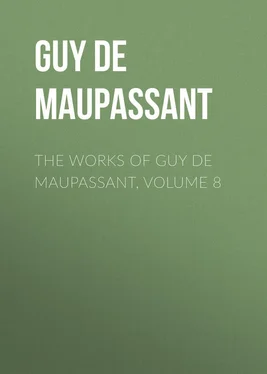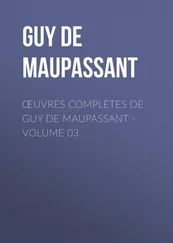Guy Maupassant - The Works of Guy de Maupassant, Volume 8
Здесь есть возможность читать онлайн «Guy Maupassant - The Works of Guy de Maupassant, Volume 8» — ознакомительный отрывок электронной книги совершенно бесплатно, а после прочтения отрывка купить полную версию. В некоторых случаях можно слушать аудио, скачать через торрент в формате fb2 и присутствует краткое содержание. Жанр: literature_19, foreign_antique, foreign_prose, на английском языке. Описание произведения, (предисловие) а так же отзывы посетителей доступны на портале библиотеки ЛибКат.
- Название:The Works of Guy de Maupassant, Volume 8
- Автор:
- Жанр:
- Год:неизвестен
- ISBN:нет данных
- Рейтинг книги:4 / 5. Голосов: 1
-
Избранное:Добавить в избранное
- Отзывы:
-
Ваша оценка:
- 80
- 1
- 2
- 3
- 4
- 5
The Works of Guy de Maupassant, Volume 8: краткое содержание, описание и аннотация
Предлагаем к чтению аннотацию, описание, краткое содержание или предисловие (зависит от того, что написал сам автор книги «The Works of Guy de Maupassant, Volume 8»). Если вы не нашли необходимую информацию о книге — напишите в комментариях, мы постараемся отыскать её.
The Works of Guy de Maupassant, Volume 8 — читать онлайн ознакомительный отрывок
Ниже представлен текст книги, разбитый по страницам. Система сохранения места последней прочитанной страницы, позволяет с удобством читать онлайн бесплатно книгу «The Works of Guy de Maupassant, Volume 8», без необходимости каждый раз заново искать на чём Вы остановились. Поставьте закладку, и сможете в любой момент перейти на страницу, на которой закончили чтение.
Интервал:
Закладка:
He asked himself: "What made this Maréchal leave all his fortune to Jean?"
It was not jealousy now which made him dwell on this question, not the rather mean but natural envy which he knew lurked within him, and with which he had been struggling these three days, but the dread of an overpowering horror; the dread that he himself should believe Jean, his brother, was that man's son.
No. He did not believe it; he could not even ask himself the question which was a crime! Meanwhile he must get rid of this faint suspicion, improbable as it was, utterly and for ever. He craved for light, for certainty – he must win absolute security in his heart, for he loved no one in the world but his mother. And as he wandered alone through the darkness he would rack his memory and his reason with a minute search that should bring out the blazing truth. Then there would be an end to the matter; he would not think of it again – never. He would go and sleep.
He argued thus: "Let me see: first to examine the facts; then I will recall all I know about him, his behavior to my brother and to me. I will seek out the causes which might have given rise to this preference. He knew Jean from his birth? Yes, but he had known me first. If he had loved my mother silently, unselfishly, he would surely have chosen me, since it was through me, through my scarlet fever, that he became so intimate with my parents. Logically, then, he ought to have preferred me, to have had a keener affection for me – unless it were that he felt an instinctive attraction and predilection for my brother as he watched him grow up."
Then, with desperate tension of brain and of all the powers of his intellect, he strove to reconstitute from memory the image of this Maréchal, to see him, to know him, to penetrate the man whom he had seen pass by him, indifferent to his heart during all those years in Paris.
But he perceived that the slight exertion of walking somewhat disturbed his ideas, dislocated their continuity, weakened their precision, clouded his recollection. To enable him to look at the past and at unknown events with so keen an eye that nothing should escape it, he must be motionless in a vast and empty space. And he made up his mind to go and sit on the jetty as he had done that other night. As he approached the harbor he heard, out at sea, a lugubrious and sinister wail like the bellowing of a bull, but more long-drawn and steady. It was the roar of a fog-horn, the cry of a ship lost in the fog. A shiver ran through him, chilling his heart; so deeply did this cry of distress thrill his soul and nerves that he felt as if he had uttered it himself. Another and a similar voice answered with such another moan, but further away; then, close by, the fog-horn on the pier gave out a fearful sound in answer. Pierre made for the jetty with long steps, thinking no more of anything, content to walk on into this ominous and bellowing darkness.
When he had seated himself at the end of the breakwater he closed his eyes, that he might not see the two electric lights, now blurred by the fog, which make the harbor accessible at night, and the red glare of the light on the south pier, which was, however, scarcely visible. Turning half-round, he rested his elbows on the granite and hid his face in his hands.
Though he did not pronounce the word with his lips, his mind kept repeating: "Maréchal – Maréchal," as if to raise and challenge the shade. And on the black background of his closed eyelids, he suddenly saw him as he had known him: a man of about sixty, with a white beard cut in a point and very thick eyebrows, also white. He was neither tall nor short, his manner was pleasant, his eyes gray and soft, his movements gentle, his whole appearance that of a good fellow, simple and kindly. He called Pierre et Jean "my dear children," and had never seemed to prefer either, asking them both together to dine with him. And then Pierre, with the pertinacity of a dog seeking a lost scent, tried to recall the words, gestures, tones, looks, of this man who had vanished from the world. By degrees he saw him quite clearly in his rooms in the rue Tronchet, where he received his brother and himself at dinner.
He was waited on by two maids, both old women who had been in the habit – a very old one, no doubt – of saying "Monsieur Pierre" and "Monsieur Jean." Maréchal would hold out both hands, the right hand to one of the young men, the left to the other, as they happened to come in.
"How are you, my children?" he would say. "Have you any news of your parents? As for me, they never write to me."
The talk was quiet and intimate, of commonplace matters. There was nothing remarkable in the man's mind, but much that was winning, charming, and gracious. He had certainly been a good friend to them, one of those good friends of whom we think the less because we feel sure of them.
Now, reminiscences came readily to Pierre's mind. Having seen him anxious from time to time, and suspecting his student's impecuniousness, Maréchal had of his own accord offered and lent him money, a few hundred francs perhaps, forgotten by both, and never repaid. Then this man must always have been fond of him, always have taken an interest in him, since he thought of his needs. Well then – well then – why leave his whole fortune to Jean? No, he had never shown any more marked affection for the younger than for the elder, had never been more interested in one than in the other, or seemed to care more tenderly for this one or that one. Well then – well then – he must have had some strong secret reason for leaving everything to Jean – everything – and nothing to Pierre.
The more he thought, the more he recalled the past few years, the more extraordinary, the more incredible was it that he should have made such a difference between them. And an agonizing pang of unspeakable anguish piercing his bosom made his heart beat like a fluttering rag. Its springs seemed broken, and the blood rushed through in a flood, unchecked, tossing it with wild surges.
Then in an undertone, as a man speaks in a nightmare, he muttered: "I must know. My God! I must know."
He looked further back now, to an earlier time, when his parents had lived in Paris. But the faces escaped him, and this confused his recollections. He struggled above all to see Maréchal with light, or brown, or black hair. But he could not; the later image, his face as an old man, blotted out all others. However, he remembered that he had been slighter, and had a soft hand, and that he often brought flowers. Very often – for his father would constantly say: "What, another bouquet! But this is madness, my dear fellow; you will ruin yourself in roses." And Maréchal would say: "No matter; I like it."
And suddenly his mother's voice and accent, his mother's as she smiled and said: "Thank you, my kind friend," flashed on his brain, so clearly that he could have believed he heard her. She must have spoken those words very often that they should remain thus graven on her son's memory.
So Maréchal brought flowers; he, the gentleman, the rich man, the customer, to the humble shop-keeper, the jeweler's wife. Had he loved her? Why should he have made friends with these tradespeople if he had not been in love with the wife? He was a man of education and fairly refined tastes. How many a time had he discussed poets and poetry with Pierre. He did not appreciate these writers from an artistic point of view, but with sympathetic and responsive feeling. The doctor had often smiled at his emotions which had struck him as rather silly; now he plainly saw that this sentimental soul could never, never have been the friend of his father, who was so matter-of-fact, so narrow, so heavy, to whom the word "Poetry" meant idiocy.
Конец ознакомительного фрагмента.
Интервал:
Закладка:
Похожие книги на «The Works of Guy de Maupassant, Volume 8»
Представляем Вашему вниманию похожие книги на «The Works of Guy de Maupassant, Volume 8» списком для выбора. Мы отобрали схожую по названию и смыслу литературу в надежде предоставить читателям больше вариантов отыскать новые, интересные, ещё непрочитанные произведения.
Обсуждение, отзывы о книге «The Works of Guy de Maupassant, Volume 8» и просто собственные мнения читателей. Оставьте ваши комментарии, напишите, что Вы думаете о произведении, его смысле или главных героях. Укажите что конкретно понравилось, а что нет, и почему Вы так считаете.












